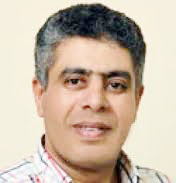The Egyptian opposition is in dire need of creative ideas that can enable them to defeat the ruling Muslim Brotherhood, wrote several commentators. As many opposition groups focus on the constitution and the constituent assembly, parties need to consider new mechanisms to gain the support of Egyptians, who have proved their inclination towards Islamists.
The naked politicians
Moustafa Al-Naggar
Al-Masry Al-Youm newspaper
Al-Naggar starts his column referring to a cartoon published on the cover page of Al-Siyasy magazine, a publication issued by Al-Masr Al-Youm, showing famous political figures undressed. The writer, who was one of those drawn, states he wasn’t offended for being criticised as such.
However, the only remark he had is seeing the Al-Azhar Grand Imam and a priest from the church among the naked group of politicians in the drawing. He argues that although politicians are game for such criticism, there should be more respect paid to religious institutions and their representatives.
If the message of the cartoon here is to criticise Al-Azhar’s initiative to reject violence, in the belief that it allows authorities the power to oppress the demonstrators, the writer calls upon the different political groups to carefully reread the document. He believes that authorities do not need an initiative from any institution to practise violence against protesters or to continue to abuse human rights. The cover page, despite spreading over social media networks, was banned from print.
Al-Naggar denounces the move stating that in an era of digital journalism and media convergence, banning a cartoon from print isn’t a wise initiative. Despite the harsh criticism on the cover page, freedom of expression should not be limited after the 25 January Revolution.
The difficult questions
Emad Al-Din Hussein
Al-Shorouk newspaper
After the Muslim Brotherhood experience in ruling the country, especially during the past few weeks, Hussein puts himself in the shoes of the National Salvation Front (NSF) and asks what should be done to end this regime. The presidency and the Brotherhood are indeed in a major predicament, says Hussein. But the opposition is also in a similar crisis. In the writer’s opinion, opposition groups need to consider a number of difficult questions as they think of methods to defeat the ruling power of the Brotherhood.
One of the important questions to be asked is whether or not Egyptians can psychologically afford the continuous demonstrations and clashes that occur intensively on a weekly basis. What is the benefit of closing Tahrir Square and hindering ordinary citizens from finalising their issues in the city centre? Hussein also asks why don’t the opposition leaders think of the ways used by the Brotherhood to gain massive public support.
He advises the opposition groups to organise medical camps and focus on solving the daily problems that bother the lives of many underprivileged in Egypt. This is how the Islamist group is working on the ground to mobilise people, gain their support and prepare for winning the majority of the seats in the upcoming parliament. The opposition, in Hussein’s viewpoint, is in a dire need for a set of creative ideas to beat the Brotherhood.




